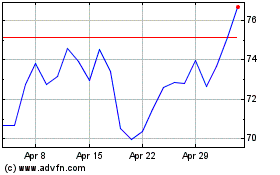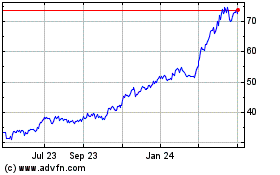By Cassandra Sweet
Low electricity prices are sapping the profits of power-plant
operators.
Companies that sell electricity to utilities, such as Dynegy
Corp., Calpine Corp and NRG Energy Inc., reported slim profits or
losses in the third quarter, as they contend with wholesale power
prices that have fallen in recent years along with the price of
natural gas.
Average wholesale electricity prices have dropped 15% this year
to $29.70 a megawatt-hour, according to a Wall Street Journal
analysis of power market data from the Energy Department. That is
43% below the 2014 average.
On Friday, NRG reported a quarterly profit of $393 million,
compared to $67 million a year earlier. However, excluding a gain
from asset sales in the latest period and a write-down a year
earlier, earnings fell sharply due to squeezed energy margins and
costs to pay off debt. Revenue dropped to $3.95 billion from $4.43
billion a year earlier.
The company's quarterly results beat analysts' expectations, and
NRG shares rose 9% to $11.03 in Friday trading. However, the stock
remains down 6% on the year.
"Our generation business performed well during some very
challenging market conditions," NRG Chief Executive Mauricio
Gutierrez said during a conference call Friday with analysts.
Dynegy on Tuesday posted a quarterly loss of $249 million on
$1.18 billion of revenue, compared to a $24 million loss on $1.23
billion in revenue a year earlier. Calpine last week reported a
profit of $295 million, up 8% from the year-earlier quarter, on
revenue of $2.36 billion; but its profit for the first nine months
of the year was just $68 million, down 76%.
"It's an adverse environment because of the low gas prices, and
it's aggravated by the growth of renewables," said Hugh Wynne, an
analyst at investment research firm SSR LLC in Stamford, Conn.
Natural gas is becoming a dominant fuel for U.S. power plants,
and with its price at historic lows, operators of commercial
nuclear and coal plants are taking a hit. Also, power demand across
much of the U.S. is flat, which weighs on electricity prices and
power-plant margins.
U.S. electricity sales this year through August totaled 2.5
billion megawatt-hours, down nearly 1% compared to the same period
a year ago, according to data from the Department of Energy.
Dynegy, which owns about three dozen coal and natural gas-fueled
plants across the U.S., is responding to the low prices by
improving efficiency through both streamlining operations and
buying plants to capitalize on scale.
It is also ramping up lobbying efforts with state and federal
regulators -- and lawsuits -- to maintain a level playing field in
the power markets, Chief Executive Bob Flexon said.
Those efforts include opposing a plan New York officials
approved last August to subsidize money-losing nuclear power plants
to keep them operating, a measure that Mr. Flexon contends gives
plant owner Exelon Corp. an unfair advantage.
"You've undermined wholesale price formation because out-of-the
money assets are given billions of dollars to stick around," he
said of the subsidies. Shares of the Houston-based company, which
rose 6% to $8.31 on Friday, are off about 38% for the year.
Chicago-based Exelon has been faring better than some rivals
since it also owns regulated utilities. They have more stable
profits because utilities can pass on their costs to customers in
the form of higher rates and typically enjoy a guaranteed rate of
return on their investments. Shares of Exelon closed significant
lower Friday at about $32.69, but are up about 18% this year.
The company last week posted a third-quarter profit of $490
million, down 22%, but its adjusted earnings and revenue rose. Net
income for its ExGen commercial-power generation unit fell 37% from
a year earlier to $236 million.
"We're not happy with the outlook that we see at ExGen," Exelon
Chief Executive Christopher Crane said last week during a
conference call with analysts.
Power plant owners that don't own utilities, such as Dynegy and
Calpine Corp., have had a tougher time. "The wholesale power
markets have disappointed in 2016," Calpine Chief Executive Thad
Hill said during a conference call with analysts last week.
Calpine, which owns several dozen gas-fired power plants,
so-called peaker plants and geothermal power generators, narrowed
its full-year outlook for adjusted earnings before interest, taxes
and other items to between $1.8 billion and $1.85 billion, from
$1.8 billion to $1.95 billion. Calpine's shares are down about 21%
this year at about $11.43 Friday.
He added that he expects wholesale prices to start rising as
early as next year in some areas, as more companies shut
unprofitable power plants and electricity supplies get tighter.
"There is a reason to believe in recovery."
Write to Cassandra Sweet at cassandra.sweet@wsj.com
(END) Dow Jones Newswires
November 05, 2016 02:48 ET (06:48 GMT)
Copyright (c) 2016 Dow Jones & Company, Inc.
NRG Energy (NYSE:NRG)
Historical Stock Chart
From Mar 2024 to Apr 2024

NRG Energy (NYSE:NRG)
Historical Stock Chart
From Apr 2023 to Apr 2024
